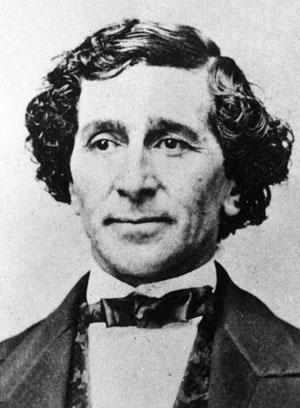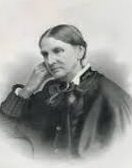
The introduction of the ‘United Firm’ in 1832 was, I think, an attempt to provide needed structure to the Church and its members. Any organization provides roles for individuals and ways that those roles interact with each other and the outside world. As a result, the scriptures covered by this week’s Come Follow Me lesson address our roles in society and how we should act to improve the Church and make ourselves more like our Heavenly Parents.
God gives knowledge to people who seek it.
Our roles are based on knowledge—knowledge not only of what we are supposed to do and for who, but also of who we are and what values we should use in our lives. Key elements of this knowledge come from God, and finding and believing in this knowledge is part of what makes us a saint, as early British member Louisa Bradford describes in the following:
I’ll be a Saint
by Louisa Bradford
- I’ll be a Saint, in Israel’s God believing,
- Whose power and wisdom fram’d the universe;
- From whom I’m life, and health, and strength receiving:
- His matchless praises, Oh! my soul rehearse.
- I’ll be a Saint——His Son, my Saviour loving,
- He my affection’s prime object shall be;
- And Oh! what care I for the world’s reproving,
- He loves, and manifests His love to me.
- I’ll be a Saint——the Holy Ghost beseeching,
- In this frail tabernacle to abide;
- I thirst for His divine effectual teaching
- Into all truth my willing soul to guide.
- I’ll be a Saint——the men of God obeying,
- With heavenly wisdom, light, and knowledge fill’d;
- No proud self-will, nor stubbornness displaying,
- To them will I in meek submission yield.
- I’ll be a Saint——for that same faith contending,
- Deliver’d once to Saints of early days;
- The faith the holy martyrs died defending,
- E’en in the lighted faggot’s fearful blaze.
- I’ll be a Saint——in Jesus’ knowledge growing,
- Unto salvation, that can make me wise;
- Not to the flesh, but to the Spirit sowing,
- That I eternal life may realize.
- I’ll be a Saint—with pure and genuine feeling,
- Loving the people of Jehovah’s choice;
- To whom He is His purposes revealing,
- Who knowing, cheerfully obey His voice.
- I’ll be a Saint——the glorious Gospel spreading;
- From house to house the “printed word” I’11 bear.
- With sisters dear, reproach or scorn not dreading,
- And warn my neighbours; for the end is near.
- I’ll be a Saint——out of great Bab’lon fleeing,
- To Zion’s land, all other lands above;
- The mighty God, my lorn condition seeing,
- Will shortly open up my way in love.
- I’ll be a Saint——and go on to perfection;
- And, should I sleep before the Lord appears,
- May I have part in the first resurrection,
- And live and reign with him a thousand years.
1852
What was the United Firm?
A line can be drawn from the early efforts of the ‘United Firm’ to the later efforts to form a ‘United Order.’ Both efforts involved going beyond the traditional bounds of what a Church was to create structures for society that brought society closer to Zion. And both systems were promoted by the Church, and members were asked to participate in the effort.

While Henry Maiben, author of the following poem, didn’t find and join the Church in England until 1851, he was one of that group of British poets who had a lasting impact after his move to in Utah. Maiben was also a lyricist, actor and painter, one of the leading actors in the Salt Lake Dramatic Company. His poetry appears in LDS publications from the Millennial Star in England to the Contributor, prior to his death in 1883. The following elegy to the “United Order” suggests what is necessary to live in the kind of Zion society that both the Order and the United Firm foresaw.
The United Order
by Henry Maiben
- Hark! the sound goeth forth; ‘tis the good shepherd’s voice.
- Ev’ry Saint who is wise will take heed and obey.
- Let us prove we have wisdom and light, by our choice,
- As we turn in good faith from our idols away.
- Consecrating ourselves and our strength to the Lord,
- With our means, and in fact, all that’s under our care,
- And uniting together with joyful accord
- In the Order of Zion, so charming and fair.
-
-
- “Thy kingdom come” should be our prayer,
- “The will be done” our constant care.
- That we may all in chorus sing,
- “We hail thee, Jesus Christ, our King.”
-
- Let us love one another, and strive to be one
- In our efforts to build up the Kingdom of God;
- That His will may on earth and in heaven be done,
- Then we’ll live without fear of the chastening rod.
- We will beautify Zion, our homes we’ll adorn,
- And we’ll cultivate freely choice flowers and fruits;
- We’ll not muzzle the ox when he treads out the corn,
- But with kindness control human beings and brutes.
-
-
- “Thy kingdom come” should be our prayer,
- “The will be done” our constant care.
- That we may all in chorus sing,
- “We hail thee, Jesus Christ, our King.”
-
- Oh! how pleasant ‘twill be, when we’re joined heart and hand,
- In our earnest endeavors for mutual good;
- For then love, joy and peace will prevail o’er the land,
- And the way to be happy be well understood.
- and whenever we meet on occasions like this,
- to give vent to our feelings, to God we’ll sing songs;
- Realizing that he is the source of our bliss,
- And our heartfelt thanksgiving unto Him belongs.
-
-
- “Thy kingdom come” should be our prayer,
- “The will be done” our constant care.
- That we may all in chorus sing,
- “We hail thee, Jesus Christ, our King.”
-
1875
I can help “advance the cause” of Christ and His Church.
A familiar issue in any organization is the tension between the obligation of each individual to the organization and the individual’s needs for himself and his family. Of course, there isn’t a final answer for this tension, except that each individual should probably support both the organization and himself. This is also true of the Church and of the ‘cause of Christ’, at least as far as that cause requires organization. So we are all involved in building and advancing these Church—making it more capable of serving others.
I’m not sure that the poet in this poem is talking only of the Church. It reads to me like he is saying that the acorn is himself—an individual. But I can also see reading this poem as referring to the Church, an acorn growing to fill the earth. Although Edward S. Shaw’s poetry appeared occasionally in LDS publications, I haven’t been able to find out much about him.
The Acorn
By Edward S. Shaw
- Dear friends, behold this tiny fruit:
- It seems a wondrous thing,
- That, wrapt up in an acorn’s shell,
- Should live a forest king.
- But plant it in a genial soil,
- And as the year rolls round,
- Then may you see a hardy plant
- Appear above the ground.
- Observe its growth: it rises high;
- Its limbs stretch far and wide;
- The acorn has become a tree;
- The tree, the woodland’s pride.
- And though a boy, I am a Saint,
- And hope to be a man,
- To grow in grace and understand
- The gospel’s mighty plan, –
- To build up temples to the Lord, –
- To spread his truths abroad;
- And on Mountain Zion, when redeemed,
- To stand — a son of God.
1860
The Lord will lead me along.

In addition to knowledge, we often need direction to help us in our roles in the Church and similar organizations. If nothing else, we need to be led to a starting point. Then, revelation is needed because our knowledge doesn’t cover all possible situations, and because the environment and our understanding changes over time. So part of following the Lord is learning to follow his lead.
Utah Poet Laureate Hannah Last Cornaby discusses this need in the following poem. Cornaby was a native of England who joined the Church with her husband in 1852 and immigrated to Utah the following year. Best known for her hymn “Who’s on the Lord’s Side?” (Hymns #260), she also published a book, Autobiography and Poems, in 1881.
Lead Me To the Rock
by Hannah Last Cornaby
- When my spirit with sorrow is overwhelmed,
- Then, from out of the depths comes the cry,
- As my earthly friends leave me, lead me I pray,
- “To the rock that is higher than I.”
- As my children, by death, are called from my arms,
- To their Father and Mother on High;
- Then, all lonely and weak, I pray to be led,
- “To the rock that is higher than I.”
- In affliction’s dark hour, when heart and flesh fail,
- And temptations my faith sorely try,
- Then, more earnest I cling, for strength and defense,
- “To the rock that is higher than I.”
- If prosperity sheds its light on my path,
- And kind friends, to encourage, are nigh,
- In thanksgiving and praise, I ever am led,
- “To the rock that is higher than I.”
- When I seek at earth’s cisterns, my thirst to assuage,
- And find them all broken and dry,
- Then lead me I pray, for the life giving draught,
- “To the rock that is higher than I.”
- Or, when persecution and trouble assail,
- And their arrows are swift hurling by,
- I fear not the shafts; while for shelter I’m led
- “To the rock that is higher than I.”
- E’en death, the last enemy cannot destroy,
- While upon a strong arm I rely;
- The Priesthood eternal is leading me on,
- “To the rock that is higher than I.”
1881
I can receive all things with thankfulness.
Working within any organization requires working well with others, and recognizing the value of their work and roles. This not only includes our co-workers in the gospel, but also the blessings we receive from God. A practice of thankfulness is vital to our lives.
Zion’s poetess, Eliza R. Snow, weighs in with this response to friends across Utah who paid for her nine month-long tour of Europe and the Middle East in 1872.
Responsive to My Magnanimous Friends
by Eliza R. Snow
- Impress’d with kindness which exhales
- Beneficence unsought;
- I fain would speak, but language fails
- To grasp the swelling thought.
- E’en gratitude, deep cherish’d word,
- Unable to express
- The feelings in my bosom stirr’d,
- Dissolves in thankfulness.
- I go with humble, grateful heart
- For every kindness shown:
- May Heav’n its richer gifts impart
- To each and every one.
- I go depending on the care
- Of God, our Father God;
- For which, I ask your faith and prayers,
- While I remain abroad.
- The warm emotions of the heart
- Too full for utterance,
- Must bask in silence—must resort
- T’ unspoken eloquence.
1872
The call to serve God matters more than where I serve.
A very human problem with any organization is the focus we often have on our place in the hierarchy. Too often we apply the hierarchy to the value of the work done, and giving more credit to those higher in the hierarchy, despite the frequent, clear teaching in the scriptures against this.
Here, Eliza R. Snow recognizes the hierarchy, specifically Queen Victoria, who was the most powerful woman in the world when this poem was written. But Snow points out that the Queen has been presented with something of far greater worth, and urges her to use her influence to promote it further.
Stanzas on the Presentation of the Book of Mormon to Queen Victoria
by Eliza R. Snow
- Of all the monarchs of the earth
- That wear the robes of royalty—
- She has inherited by birth
- The broadest wreath of majesty.
- From her wide territorial wing
- The sun does not withdraw its light;
- While earth’s diurnal motions bring
- To other nations day and night.
- All earthly thrones are tottering things,
- Where lights and shadows intervene;
- And regal honour often brings
- The scaffold or the guillotine.
- But still her sceptre is approv’d:
- All nations deck the wreath she wears;
- Yet, like the youth whom Jesus lov’d,
- One thing is lacking, even there.
- But lo! a prize possessing more
- Of worth, than gems with honour rife—
- A herald of salvation bore
- To her the words of endless life.
- That Gift, however fools deride,
- Is worthy of her royal care,
- She’d better lay her crown aside
- Than spurn the light reflected there.
- O would she now her influence bend—
- The influence of royalty,
- Messiah’s kingdom to extend,
- And Zion’s “nursing mother” be:
- Thus with the glory of her name
- Inscrib’d on Zion’s lofty spire,
- She’d win a wreath of endless fame,
- To last when other wreaths expire.
- Though over millions call’d to reign,
- Herself a powerful nation’s boast,
- ‘Twould be her everlasting gain
- To serve the king, the Lord of Hosts
- For there are crowns and thrones on high,
- And kingdoms there, to be conferr’d—
- There honours wait that never die;
- There fame’s immortal trump is heard.
- Truth echoes—’tis Jehovah’s word;
- Let kings and queens and princes hear,
- In distant isles the sound is heard;
- Ye heav’ns rejoice! O earth, give ear!
- The time, the time is now at hand
- To give a glorious period birth;
- The Son of God will take command,
- And rule the nations of the earth.
1844
